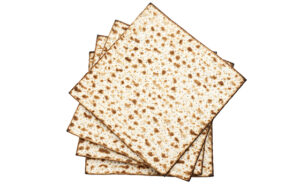ORDINARILY, IF I caught my children sneaking around a darkened house with a candle while searching for pieces of bread, I’d be suspicious. But if it’s the night before Passover, that’s a different story. As odd as that behavior might appear it’s all part of the deep spiritual practice of searching for hametz.
In preparation for Passover, our Tradition requires us to clean our homes of any food made with grains that have leavened (hametz). Some people spend hours cleaning their homes: scrubbing counters, cleaning cabinets, or scouring ovens. As a kid, I remember the great schleps my siblings and I took as we lugged dusty storage boxes of hametz-free dishes, cookware and cutlery from the basement to the kitchen.
Once this great spring-holiday cleanout has been completed, the Torah guides us to spend the night before Passover searching our homes for any last crumbs that we may have overlooked. In order to make the act as “real” as possible for the whole family, parents will often place noticeable pieces of bread around the home for the kids to find easily. The time spent searching is meant to symbolically re-enact the night prior to our redemption from slavery in Egypt. We are taught that G-d waited with great anticipation for this moment. We model that anticipation by searching with a candle, like an Israelite slave huddled in the darkness, waiting for G-d to knock and lead us out.
The next morning- standing over a tin bucket and under the proper supervision- we burn the discovered bread and proclaim the following: All leaven, or anything leavened, which is in my possession, whether I have seen it or not, whether I have observed it or not, whether I have removed it or not, shall be considered nullified and ownerless as the dust of the earth.
Those words are so powerful, for a moment I was thinking about Rosh Hashanah and its central ritual: tashlich, the opportunity to cast off our sins by throwing bread into flowing water. As we pick off each piece of bread and watch it float away, our sins travel further from us.
Like the release that comes with tashlich, the physical process of thoroughly cleaning our homes, searching for bread crumbs and burning them lends itself to a deeper spiritual practice. Scrubbing and sweeping over and over again can remind us of the hard work we will have to do in order to clear the way for introspection. Later in the evening, enveloped by darkness, one single candle glows modestly lighting only a few inches before you. This potentially reflects the true darkness-to-light ratio in our own personal lives. Or maybe it’s the stark image of how isolated we are within our own worlds.
And what does the light of that candle reveal? Each Passover our souls start out like matzah, humble and light. But over the course of the year any number of experiences cause that flat dough to rise and the soul to become heavy. So heavy that instead of the liberty we yearn for, our own soul becomes an anchor; pinning us to one particular way of thinking or seeing things instead of setting us free.
I wonder, as we examine our internal hametz, would we find the crumbs of our daily living? Would we discover the left-over schmutz of our poor decisions, broken promises, and personal disappointments that led us to our inflated egos and beyond self-recognition?
No doubt the remnants of our moral failures carry a great burden. Yet the beauty of searching and burning our hametz is that we can transform those mistakes into pieces of wisdom that can nourish us throughout our lives. Perhaps where there used to be egocentricity, now we find humility. Maybe we are granted perspective and can now locate the points where we’ve gone astray. Moreover, watching our bread crumbs disintegrate into ash and blow away invites us to remember that we are not meant to dwell in Egypt as slaves to our past behaviors.
May you have a meaningful and hametz-free Passover!







